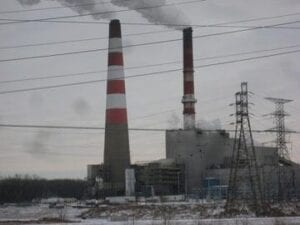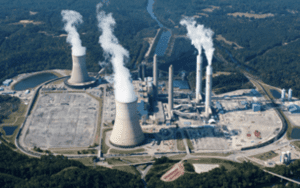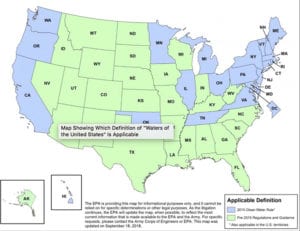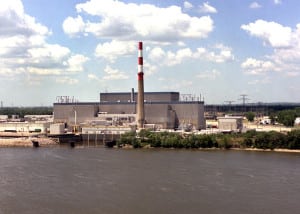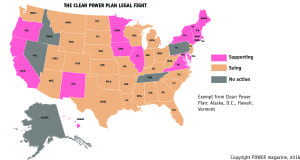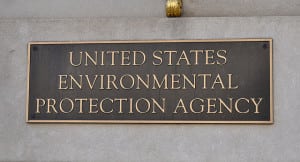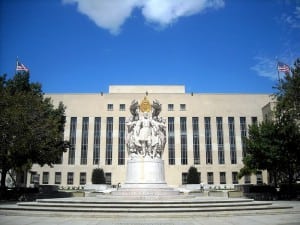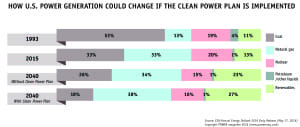Supreme Court
-
Legal & Regulatory
Power in the Shadows: Energy and Environment in the Shadow Docket
In three front-page rulings this summer, the U.S. Supreme Court made sweeping changes to the ways that federal judges will review future agency actions—including a rejection of its longstanding Chevron
-
Commentary
Advancing Carbon Capture: Supreme Court Ruling and Innovative Solutions for Reducing Emissions
As global efforts intensify to mitigate climate change, carbon capture has emerged as a vital technology to curb greenhouse gas emissions. Power generation, a major source of global carbon dioxide (CO2) emissions, is under increasing pressure to adopt technologies that reduce its carbon footprint. As highlighted by recent rulings and federal initiatives, the focus on […]
-
Legal & Regulatory
Supreme Court Clears Way for Limits on Power Plant Mercury, Methane Emissions
The U.S. Supreme Court has said that rules requiring power plants burning fossil fuels to reduce emissions of toxic substances can stand, dealing a blow to several Republican-led states and some power generators that had challenged the regulations. The Environmental Protection Agency (EPA) in May of this year finalized rules on emissions of mercury, after […]
-
Legal & Regulatory
Gray Skies for U.S. Power Generation? Uncertainty and Turmoil on the Horizon
The Supreme Court’s landmark decision this past summer in Loper Bright Enterprises v. Raimondo marks a significant shift in administrative law by overturning the long-standing principle of Chevron deference, which was established in Chevron U.S.A. Inc. v. Natural Resources Defense Council Inc. in 1984. The Loper ruling from earlier this year is poised to have […]
-
Courts
The Chevron Deference Is Dead. What Does It Mean for the Power Sector?
The U.S. Supreme Court on June 28 overturned the Chevron doctrine—a forty-year-old precedent—significantly curtailing the power of federal agencies to interpret ambiguous statutory provisions, even in areas of agency expertise. The landmark 6–3 decision could have far-reaching effects on the power industry, with specific impact on sweeping energy regulations from the Environmental Protection Agency (EPA) […]
-
Legal & Regulatory
Supreme Court Halts EPA’s ‘Good Neighbor Plan’
The U.S. Supreme Court in a 5–4 vote blocked enforcement of the Environmental Protection Agency’s (EPA’s) final “Good Neighbor Plan,” a rule intended to significantly cut smog-forming nitrogen oxide (NOx) pollution from power plants and other industrial facilities in 23 states. In the meantime, the applicants, which include the states of Ohio, Indiana, and West […]
-
Coal
Group: EPA’s Coordinated Regulatory Assault on Coal Power Could Push Retirements Beyond 86 GW by 2030
The Environmental Protection Agency (EPA) is readying a regulatory sweep targeting more stringent limits on traditional pollutants that could accelerate coal power plant closures. A coal trade group estimates that even without new rules, 86 GW of coal generation is slated to retire by 2030. While the U.S. Supreme Court in June curtailed the EPA’s […]
-
Legal & Regulatory
‘Major Questions’ Impacts Energy Regulation
On the final day of the Supreme Court’s term, the Court ruled in favor of West Virginia and other petitioners challenging the claimed regulatory authority that underlaid the Clean Power Plan (CPP)—the
-
Commentary
Reaction Swift After Supreme Court Strips EPA’s Authority Over Emissions
Reaction on both sides of the issue was swift after the U.S. Supreme Court in a 6-3 vote said the U.S. Environmental Protection Agency (EPA) should not have the authority to broadly regulate emissions of greenhouse gases (GHG) from the nation’s power plants. The case, West Virginia vs. EPA, could have ramifications for federal government […]
-
Legal & Regulatory
Supreme Court Limits EPA Authority to Regulate Power Plant Emissions
The U.S. Supreme Court has curbed the Environmental Protection Agency’s (EPA’s) options for limiting emissions of greenhouse gases (GHG) from power plants, an important environmental decision that could impact the federal government’s authority to enforce other regulations. The court in a 6-3 vote, with conservatives in the majority, on June 30 said the EPA does […]
-
Environmental
SCOTUS Hears Arguments on EPA’s Purview Over Power Plant GHG Emissions
The U.S. Supreme Court is hearing arguments on a landmark case that could determine whether the Environmental Protection Agency (EPA) has the authority to broadly interpret the Clean Air Act (CAA) to establish carbon emission standards for coal, oil, and gas-fired power plants. Arguments in West Virginia v. Environmental Protection Agency (No. 20-1530) presented to […]
-
News
Nuclear Subsidy Dispute Now Rests with FERC, Competitive Generators Say
The U.S. Supreme Court’s refusal to reconsider industry-led challenges to state nuclear subsidy programs in New York and Illinois leaves the contentious matter to the Federal Energy Regulatory Commission (FERC). The high court on April 15 declined to accept petitions for review of decisions by the Second Circuit and Seventh Circuit, dealing a major blow […]
-
News
EPA: Mercury Rules for Coal, Oil Power Units Not ‘Appropriate and Necessary’
Because compliance costs to coal- and oil-fired power plants for the Mercury and Air Toxics Standards (MATS) far exceed quantifiable benefits to regulating hazardous air pollutant (HAP) emissions, the Trump administration has proposed it is not “appropriate and necessary” to regulate HAP emissions from power plants under Section 112 of the Clean Air Act (CAA), […]
-
News
Amid Broad Legal Challenges, EPA Proposes Narrower Definition of WOTUS
In a move widely applauded by the power industry, the Environmental Protection Agency (EPA) and Department of the Army proposed a new definition of “waters of the U.S.” (WOTUS) that could exempt groundwater and ditches from regulation under the Clean Water Act (CWA). The measures follow other recent significant regulatory actions by the agency. On […]
-
Commentary
Courts Back State Flexibility on Choice of Generation
Power regulation in the U.S. is split between the federal and state levels, with the Federal Energy Regulatory Commission (FERC) having jurisdiction over the wholesale sales of electricity and the states
-
Renewables
POWER Digest [November 2018]
Ørsted Snaps Up Deepwater Wind in Major U.S. Offshore Wind Deal. Danish offshore wind farm developer Ørsted in October entered into an agreement with U.S.-based D.E. Shaw Group to buy a 100% equity interest
-
Legal & Regulatory
Competitive Generators Look to the Supreme Court After Seventh Circuit Declines Rehearing on Nuclear Subsidies
The Seventh Circuit Court of Appeals has declined to rehear a case that challenges nuclear subsidies in Illinois, effectively dealing a blow to a group of competitive generators, which have fought the measure for several years. In an order issued on October 9, the appellate court said its full judicial panel had voted to deny […]
-
Legal & Regulatory
Several States Urge Federal Court to Rule on Clean Power Plan
Seventeen states have asked the U.S. Court of Appeals for the D.C. Circuit to reject the Trump administration’s efforts to further delay the court’s decision on legal challenges to the Clean Power Plan. In a filing with the court on September 4, the attorneys general of California, Connecticut, Delaware, Hawaii, Illinois, Iowa, Maine, Maryland, Massachusetts, Minnesota, […]
-
Legal & Regulatory
More Coal and Nuclear Can Replace Retired Generation, State Supreme Court Rules
The Supreme Court for the state of New Mexico affirmed a final order by state regulators to allow Public Service Company of New Mexico (PNM) to replace lost generation from two shuttered units at its 1,800-MW coal-fired San Juan Regional Generation Station with coal and nuclear resources. The case stems from a petition filed by […]
-
Legal & Regulatory
Challenge to N.Y. Nuclear Subsidies Will Go to Trial
A lawsuit challenging subsidies for New York’s nuclear plants will head to trial after the state’s Supreme Court rejected motions to dismiss it. The measure deals a small setback for Exelon Corp., whose subsidiaries own the R.E Ginna and Nine Mile Point nuclear plants in upstate New York. Defendants in the lawsuit also include Entergy […]
-
Legal & Regulatory
SCOTUS Sends Controversial WOTUS Rule into More Legal Limbo
The U.S. Supreme Court unanimously reversed and remanded a rule the Environmental Protection Agency (EPA) and the U.S. Army Corps of Engineers rolled out in 2015 that asserts federal authority over small bodies of water with a broader definition of the statutory term, “waters of the U.S.” (WOTUS). In a ruling for National Association of […]
-
Coal
Pruitt: EPA Rule to Replace the Clean Power Plan Is Coming
Environmental Protection Agency (EPA) Administrator Scott Pruitt told House lawmakers on December 7 that the agency will introduce a rule to replace the Obama administration’s legacy Clean Power Plan. Pruitt told Rep. Raul Ruiz (D-Calif.) in a brief exchange, during a hearing before the House Energy and Commerce Committee Subcommittee on Environment held on Thursday […]
-
Legal & Regulatory
Experts: If Clean Power Plan Perishes, GHG Regulation Almost Certain Under NAAQS Program
If the Clean Power Plan is scrapped or weakened, the Environmental Protection Agency (EPA) may be forced to regulate greenhouse gases (GHGs) emitted by existing power plant with wider repercussions under its National Ambient Air Quality Standards (NAAQS) program, experts have warned. While President-Elect Donald Trump promised to “scrap” the Clean Power Plan during his […]
-
Legal & Regulatory
A Look Back at 2016: The Year of Transition
A tumultuous election year that was marked by market turmoil, the events of 2016 clearly showed that big change is afoot for the power sector. Many of POWER‘s bold predictions for 2016, such as that the near-simultaneous surge in U.S. natural gas production and recent enactment of environmental rules would reshape the U.S. power sector, […]
-
Legal & Regulatory
LIVE UPDATES: The Clean Power Plan at the D.C. Circuit
Oral arguments on the merits of the Environmental Protection Agency’s (EPA’s) Clean Power Plan were concluded before an en banc panel (10 judges, rather than the anticipated three) at the D.C. Circuit Court of Appeals on September 27. West Virginia v. Environmental Protection Agency (No. 15-1363) is arguably the most important environmental case in nearly […]
-
Legal & Regulatory
How Will the Supreme Court Stay Affect the Clean Power Plan?
One of the witnesses testifying before the U.S. Senate Committee on Environment and Public Works on June 9 believes states and regulated entities will be granted additional time to comply with the Environmental Protection Agency’s (EPA’s) Clean Power Plan (CPP), if the rule is ultimately found to be lawful. Currently, the U.S. Supreme Court has […]
-
Renewables
AGs Tell EPA to Halt Aid to States Planning Clean Power Plan Compliance
The Environmental Protection Agency (EPA) must halt its drive to help states supportive of the Clean Power Plan to comply with the rule because it defies the Supreme Court stay, the attorneys general for West Virginia and Texas have urged the agency. An April 28 request to the agency by 14 states seeking technical assistance […]
-
Legal & Regulatory
EIA: Clean Power Plan Will Wallop Coal Power Generation
Even if the final Clean Power Plan is not implemented, U.S. electricity-related carbon dioxide (CO2) emissions will remain well below 2005 levels, the Energy Information Administration (EIA) said in a comparison of two cases looking forward through 2040. The cases are part of the agency’s May 17–released Annual Energy Outlook 2016 Early Release (AEO2016 Early […]
-
Legal & Regulatory
D.C. Circuit Delays Clean Power Plan Case Hearing by Months, Opts for En Banc Review
Oral arguments to assess the merits of the Clean Power Plan will now take place before a nine-judge panel at the U.S. Court of Appeals for the District of Columbia Circuit on September 27, bypassing review of challenges to the Environmental Protection Agency’s (EPA’s) controversial rule by a three-judge panel that was originally scheduled to […]
-
Legal & Regulatory
Supreme Court Strikes Down Maryland Power Plant Subsidies
In a unanimous ruling, the U.S. Supreme Court upheld a lower court decision that a program Maryland initiated in 2012 to subsidize power plant construction impermissibly invaded the Federal Energy Regulatory Commission’s (FERC’s) authority over interstate power markets. The case, Hughes v. Talen Energy Marketing, grew out of a decision by the Maryland Public Service […]



